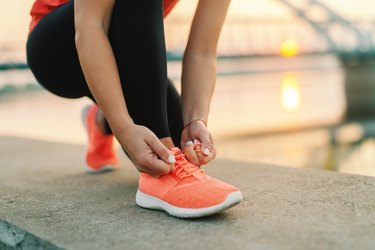
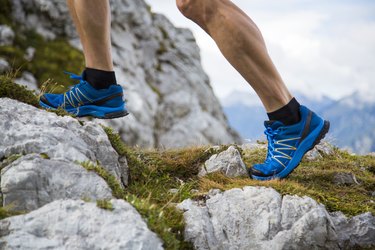
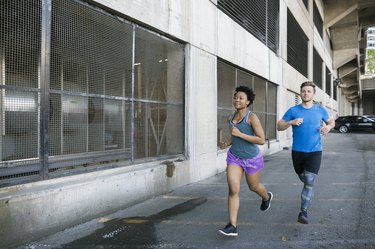
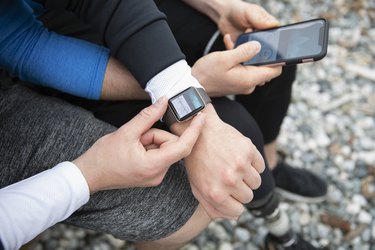
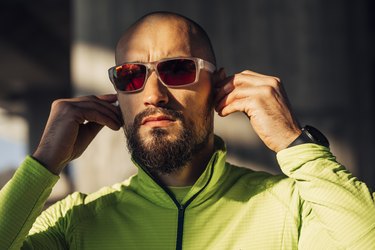
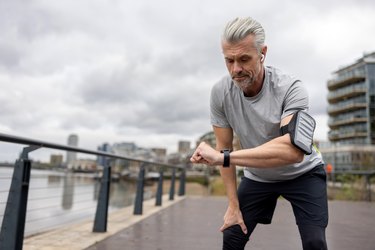
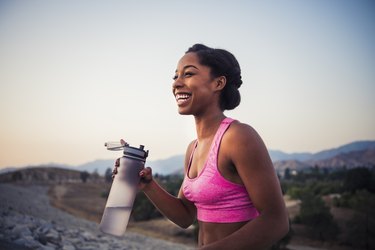
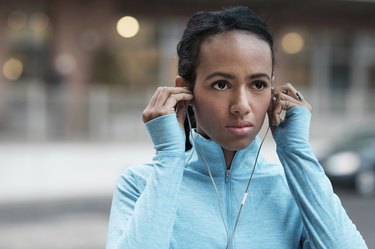
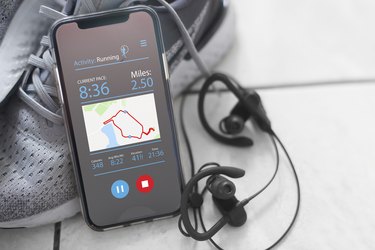
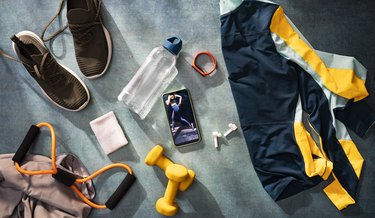
With so much running gear out there, figuring out what you need can be overwhelming. Are the $160 shoes really better than the $130 pair? Will you be too hot with a top layer? How can you stay safe on nighttime road runs? These are all normal questions — especially for those new to running.
But don't worry! Below, you'll find our comprehensive running gear guide, which explains the various types of clothing, gear, gadgets and accessories you might need and how to choose what's best for you.
Video of the Day
Video of the Day
Manufacturers sometimes market running gear according to gender, so where applicable, we've listed both women's and men's options below.
However, the main difference between most men's and women's gear is usually the width and size. Regardless of how a product is labeled, choose the version that feels and works best for your body.
Running Shoes

Shoes are the most important part of your running kit. But don't just shop by what brand you've heard other runners buy. No one running shoe brand is best for every single runner.
What's important is choosing a shoe that feels good on your feet and allows you to stride naturally. If your feet don't feel good, it makes it hard to continue on your route. Two big factors in that are:
- Cushion vs. minimal: Do you need added cushion and support under your feet or do you prefer a more minimalist feel?
- Overpronation vs. underpronation vs. neutral: It's important to know how you stride. Overpronation means your foot rolls inward; underpronation means your foot rolls outward; and neutral means your foot doesn't roll either way.
Our Picks
- Brooks Ghost 14 ($130, Brooks Running [men's]; Brooks Running [women's])
- Asics Gel-Nimbus 23 ($129.95, Asics [men's]; Asics [women's])
- New Balance 840v4 ($124.99, New Balance [men's]; New Balance [women's])
Trail Running Shoes

If you're a trail runner, the surface you're going to be running on matters in terms of what you're looking for in a shoe.
Trail running shoes generally have more support, a more intense grip, a rock plate to absorb shock and lugs on the bottom to grip the trails, as compared to treadmill or road running shoes. You'll also need to take into consideration if you need waterproof shoes for running through rain or snow.
Our Picks
Running Clothes

You could wear a cotton T-shirt and a pair of mesh shorts. But because they're not made for running, they'll end up weighing you down as you get sweatier, potentially holding you back from your next PR.
Instead, try performance gear specifically designed for running and that feature moisture-wicking, breathable, lightweight technical fabrics. Bonus points for clothing that include reflective details that help you be seen and stay safe.
And if you're braving the elements, look for warm, yet light-weight outer layers. Depending on the weather, you may want a waterproof jacket, gloves, hat or headband.
Our Picks
- Tracksmith Twilight Split Shorts ($52, Tracksmith [men's]; Tracksmith [women's])
- Nike Miler Short-Sleeve Running top ($35, Nike [men's]; Nike [women's])
- Ciele Athletics Running Hat ($40 to $80, Ciele Athletics)
- Smartwool Merino 150 Gloves ($30, Smartwool)
Running Sunglasses

If there's sun in the forecast and you're planning to be on the trails or road for a while, don't leave home without a pair of sunglasses.
"When you're looking for sunglasses, you want to find a pair that fits your head size and feels secure on your face," says Matthew Meyer, RRCA run coach and coach at Mile High Run Club in New York City. "You want to be able to forget you're even wearing them, rather than messing with them every five minutes." Lightweight is important, too.
Our Picks
- Goodr The OGs ($25, Goodr)
- Smith Ruckus Sunglasses ($209, Smith Optics)
- District Vision Keiichi ($295, District Vision)
Running Belts and Armbands

Want to bring your just your phone along for the strides? Don't bother with trying to juggle it in your hands. Slap on an armband. You can find ones that carry just your phone or ones with extra pockets for your ID or keys.
Similarly, running belts (or even running backpacks) work in two main situations: If you're going on a quick run and just need a place to stash your personals, like a phone, ID, money and keys, you'll want a belt that just has a pocket where you can keep your stuff. And if you're going for a longer run, you'll want a belt that can hold a bit more, like fuel and water.
Our Picks
- The SPIbelt ($26.99, SPI)
- Tribe Water Resistant Cell Phone Armband ($14.98, Amazon)
- Lifeproof LIFEACTIV Armband ($15.23, Amazon)
Running Water Bottles and Hydration Packs

Staying hydrated is no biggie for those running on a treadmill or a park with ample water fountains. But for runners trekking city streets or mountain trails, carrying a running water bottle may be the only way to get some sweet, sweet H2O.
And if you're running anymore than seven miles, you'll want to consider a hydration pack to help keep yourself fueled and energized. Find one with a spout, so you won't even need to stop running to drink out of it.
Our Picks
- Salomon Advanced Skin 12 Running Vest ($120, Salomon)
- Osprey Duro 1.5L ($110, Osprey)
- Aonijie Quick Grip Handheld Water Bottle ($19.99, Amazon)
Running Headphones and Earbuds

While many races discourage and sometimes even forbid the wearing of headphones or earbuds, that doesn't mean you have to suffer in silence while training. In fact, listening to music can enhance your endurance and improve your mood, according to a 2008 study published in the Journal of Sport and Exercise Psychology.
Our Picks
- Bose Sport Headphones ($129, Amazon)
- Jaybird Sport Vista ($149.99, Jaybird Sport)
- Back Bay Duet 50 Pro Earbuds ($54.99, Back Bay)
Running Watches and Trackers

If you're looking to get some feedback about your run once you're done — your pace, splits, heart rate, distance, etc. — a fitness watch is a great way to track your progress. The two most important things are getting a watch that fits properly and knowing how to use it before you start your run.
While it's not necessary, if you're serious about your running, you'll want to keep track of your stats. A running watch is a great way to do that. "Look for a watch that fits your needs, monitors your heart rate and has an accurate GPS," says Meyer.
Our Picks
- Garmin Forerunner 955 ($499.99, Kohl's)
- Apple Watch (from $399, Apple)
- Garmin Forerunner 45 ($179.99, Garmin)
Running Apps

If you're going to bring your smartphone or watch along for your run anyway, it might be worth downloading a running app, where you can store info and learn more insight about your runs. A very popular option? Strava, which also allows you to compete against others for "segment" PRs.
"I use this app religiously for my own running as well as keeping track of my various training groups," says John Honerkamp, RRCA- and USATF-certified coach and founder of The Run Collective. "Strava keeps track of all of your running stats, but also helps you motivated and brings community along with it."
Running Socks
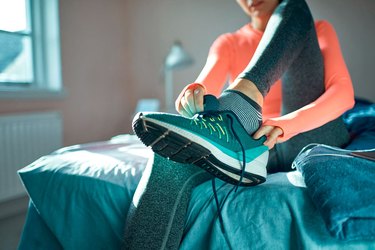
If you think your running socks don't make a difference, think again. If you're running a 5K, 10K, half marathon, marathon or any type of trail race, socks are vital in keeping your feet dry and blister-free.
First, decide whether you want thin or a thick pair — it's totally personal preference. One non-negotiable? Sweat-wicking, breathable materials (because no one wants to run in damp socks). Lastly, think about height. Especially on rocky, muddy trails that have lots of debris, you'll want a higher sock that will keep all the mess out.
Our Picks
- Balega Hidden Comfort ($18, Balega)
- Bombas Performance Running Socks ($16.50, Bombas)
- Smartwool Run Targeted Cushion Low Ankle Socks ($19, Smartwool)